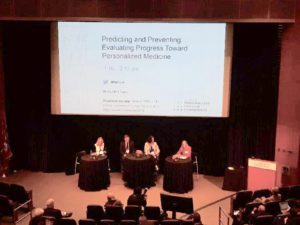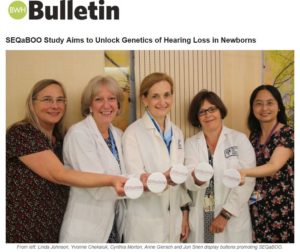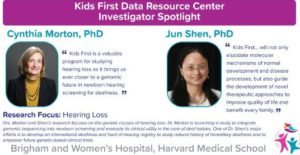14th Annual Personalized Medicine Conference, Boston, MA., November 14-15, 2018.
MODERATOR | Cynthia Casson Morton, Ph.D., William Lambert Richardson Professor of Obstetrics, Gynecology and Reproductive Biology, Professor of Pathology, Harvard Medical School; Kenneth J. Ryan, .D. Distinguished Chair in Obstetrics and Gynecology, Brigham and Women’s Hospital ….…. and our very own, SEQaBOO’s Principal Investigator
“Predicting and Preventing: Evaluating Progress Toward Personalized Medicine”
The original architects of the personalized medicine paradigm envisioned an era in which clinicians could predict, present and treat disease based on improve understanding of how human biology interacts with external environments. During this session, a panel of experts will examine our progress on each of these fronts during a wide-ranging conversation about personalized medicine’s past, present and future.
From left to right:
Luba Greenwood, J.D. Strategic Business Development and Corporate Ventures, Verily
Keith Stewart, M.B., CH.B., Carlson and Nelson Endowed Director, Center for Individualized Medicine, Mayo Clinic
Birgit Funke, Ph.D., F.A.C.M.G., Vice President, Clinical Affairs, Veritas Genetics
Former SEQaBOO team members. You will surely be missed. We wish you the very best on your next career steps!
Razan Basonbul, MBBS, MPH Juliana Manganella, BA Devon Barett, BA Patricia Levesque, MS Cui “Tracy” Song, MD
(MEE) Fellow, Otolaryngology (BCH) Clinical Researcher (BCH) Research Assistant (MEE) Clinical Researcher (BWH) Fellow, OB/GYN
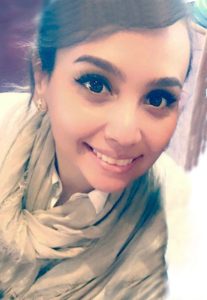
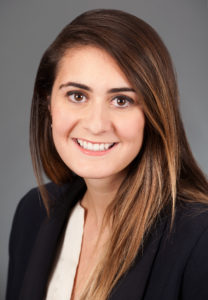
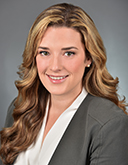
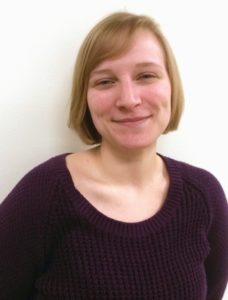
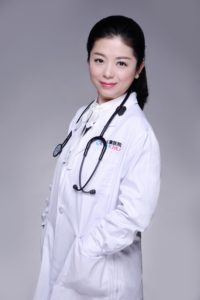
SEQaBOO welcomes guest speaker, Dr. Lilian Downie!
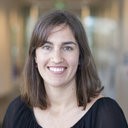
Lilian Downie, MBBS, Genetics Fellow
Victorian Clinical Genetics Services
Murdoch Children’s Research Institute
Victoria, Australia
The SEQaBOO staff enjoyed receiving guest speaker, Dr. Lilian Downie, present her work on the Melbourne Genomics Congenital Deafness project on Thursday, September 20th, 2018. The Melbourne Genomics Congenital Deafness project offered whole exome sequencing (WES) to a 2 year population based cohort diagnosed with congenital deafness on newborn screening. The aim of the project was to define to genetic aetiology of deafness and offer extended genomic analysis as a model for expanded newborn screening. Families were provided with a decision aid and genetic counselling session. In addition to deafness analysis, participants could choose to receive results for childhood onset conditions with a known treatment or intervention pathway (choice B) or all conditions, some of which do not have a known treatment or intervention pathway (choice C). The families completed evaluation surveys regarding their decision making post recruitment and at return of results. Out of the 110 patients recruited 78 results have been issued and the rate of diagnosis is 63%. 68% of patients have opted to receive additional findings. This study provides a comprehensive understanding of the genetic etiology of congenital hearing loss in our population over this two year period. The results of this project illustrate the importance of providing choice around additional findings in genomic testing.
It is always wonderful to meet and learn about other studies being conducted on newborn hearing.
Thanks for traveling all the way from the land of ‘down-under’ mate!
SEQaBOO announced in BWH Bulletin!
Gabriella Miller Kids First Research Program
Click on the picture to read article!
The Kids First Data Resource Center (DRC) has launched another Kids First Investigator spotlight! This month we featured Drs. Cynthia Morton and Jun Shen. Check out their message about their research in the Kids First program attached:
Happy Birthday Cynthia!
There would be no SEQaBOO unless this lady was born!
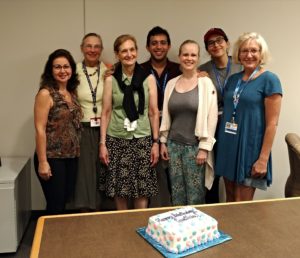
The Morton Lab wishes you a happy birthday and may we have many more years together to celebrate YOU!
Pictured left to right:
Nancy Robertson (Staff Scientist), Linda Johnson (Sr. Grant Administrator), Cynthia Morton, PhD (SEQaBOO’s Principal Investigator), Raul Pina-Aguilar, MD (Post-Doctoral Research Fellow), Netta Makinen, PhD (Post-Doctoral Research Fellow), Zeynep Ruhioglu (Medical Student) and Yvonne Chekaluk (SEQaBOO’s Project Manager)
SEQaBOO welcomes Dr. Chayada Tangshewinsirikul from Thailand
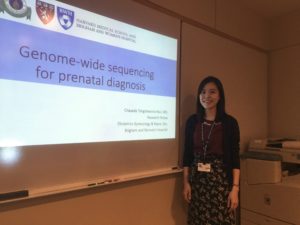
The Boston SEQaBOO team will have additional help for 2018/2019, Dr. Chayada Tangshewinsirikul, Physician, Division of Maternal Fetal Medicine, Department of Obstetrics nd Gynecology, Ramathibodi Hospital, Mahidol University, Thailand. Dr. Tangshewinsirikul is a Visiting Scholar at our Brigham and Women’s Hospital, Department of Obstetrics Gynecology & Reproduction. She received her MD degree in Maternal Fetal Medicine from Ramathibodi Hospital, Mahidol University in 2014. She has been an Obstetrician from 2012 and was promoted to be clinical instructor in 2014. She majored in Maternal Fetal Medicine, Fetal ultrasound and Prenatal diagnosis.
May 22, 2018, Dr. Tangshewinsirikul graciously presented to the Morton Lab an introduction about herself, her hospital work and the beautiful Country of Thailand. Welcome and we look forward to sharing some good Thai food with your recommendation in the Boston area!
The Boston Children’s Hospital SEQaBOO team at Dr. M. Judah Folkman Research Day
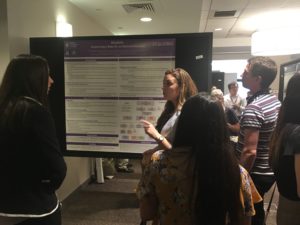
Devon had quite a crowd all asking questions about SEQaBOO !
May 23, 2018 was Dr. M. Judah Folkman Research Day at Boston Children’s Hospital (BCH) and the BCH SEQaBOO team join the event with a poster presentation. Juliana Manganella, Devon Barrett and Dr. Margaret Kenna welcomed other researchers and investigators from the Longwood Medical area to discuss our whole genome sequencing study for newborns with hearing loss.
Our own Dr. Cynthia Morton presents at the 2018 ACMG in Charlotte, NC
Clarification to the Journalist’s statement, “The goal is to enroll about 500 newborns who did not pass their initial newborn hearing screen, along with their parents, and more than 200 have been signed up so far”. SEQaBOO has not enrolled 200 subjects as of 4/19/2018 but looks forward to achieving such enrollment numbers in the near future.
Newborn Screening for Hearing Loss Might Benefit from Genomic Testing
Apr 11, 2018
CHARLOTTE, N.C. (GenomeWeb) – Sequencing-based genomic testing could be a useful complement to traditional newborn screening for detecting hearing loss in children who are missed by current methods and providing guidance for treatment and care of those who screen positive.
At the American College of Medical Genetics and Genomics annual meeting here last night, Cynthia Morton of Brigham and Women’s Hospital and Harvard Medical School pointed to several initiatives, including a research study called SEQaBOO (Sequencing a Baby for an Optimal Outcome) her own team is conducting, that are exploring the utility of genomic testing in newborn hearing screening.
Up to 1 in 300 children are born with some type of hearing loss, making it one of the most common birth defects. About 50 percent of severe childhood hearing loss cases is believed to have a genetic cause, and another 25 percent or so is due to the mother being infected with cytomegalovirus, which she passes on to her unborn child.
Of the hearing loss cases with genetic causes, about 70 percent are non-syndromic and 30 percent are syndromic. The number of genes known to be involved in hearing loss keeps climbing, Morton said, and has reached more than 150 currently.
Newborn hearing screening right after birth is standard in the US, using functional hearing tests such as automated auditory brainstem response or otoacoustic emissions. However, many screen-positive infants don’t receive follow-up care, so they never receive a diagnosis rule-out. In addition, some infants develop hearing loss later on, and by school age, 1 in 100 children have impaired hearing, suggesting that functional screening at birth misses some types of hereditary hearing loss.
The hope is that genetic screening might be able to identify children at risk of hearing loss who are missed by current newborn screening, and to help those who screen positive obtain a molecular diagnosis, which might impact their treatment and care.
For example, a 2016 study from Taiwan that involved more than 5,000 babies who received standard newborn hearing screening, as well as genetic screening for four common deafness mutations, found that more than half of those with a mutation passed their hearing test, even though their hearing deteriorated later on.
Morton said that another study, conducted in China that involved a million newborns and is currently under review, had similar findings, making the case for genetic newborn screening for hearing impairment.
Results from a genetic test may not only predict hearing loss later on but also impact treatment. For example, Morton said, hearing-impaired children with a mutation in the GJB2 gene tend to do well with sound amplification, whereas for those with mutations in other genes, such as PJVK, amplification does “more harm than good.” In addition, some genetic syndromes appear at birth to be non-syndromic hearing loss and could be discovered sooner with genetic screening.
Her team’s ongoing SEQaBOO study, which is funded by the National Institute on Deafness and Other Communication Disorders and involves Brigham and Women’s Hospital, Boston Children’s Hospital, and the Massachusetts Eye and Ear hospital, is investigating how genomic information can help with the care and management of newborns with hearing loss.
The goal is to enroll about 500 newborns who did not pass their initial newborn hearing screen, along with their parents, and more than 200 have been signed up so far. These families will receive whole-genome sequencing to identify pathogenic variants in hearing loss genes and, as an option, secondary findings in the ACMG-59 gene list. The results will be used in conjunction with the standard of care, and their clinical impact will be assessed through annual surveys. In addition, the study will look into parents’ attitudes toward and knowledge about genomic medicine.
Morton said there are other whole-genome sequencing projects underway that might result in a better understanding of the genetics of hearing loss, including Genomics England and the Gabriella Miller Kids First Pediatric Research Program.
However, she said, while whole-genome sequencing for newborns might become the standard sometime in the future, for now, what is needed is limited genetic screening in addition to the current functional hearing screening. Such genetic tests need to be inexpensive and easily interpretable, she said, noting that she is pushing ahead with getting them implemented at Brigham and Women’s Hospital.
Dr. Cui Song presents at the Morton Lab Meeting: April 3, 2018

Dr. Cui Song, Associate Chief Physician, Department of Endocrinology and Genetic Metabolic Diseases, Children’s Hospital of Chongqing Medical University, China as a Visiting Scholar at our Brigham and Women’s Hospital, Department of Pathology. Dr. Song received her MD degree in Pediatrics from Chongqing Medical University in 2015. She has been a pediatrician from 2007 and was promoted to the rank of Associate chief physician in 2017. She majored in Endocrinology and Genetic Metabolic Diseases. Dr. Song was part of the SEQaBOO research study team from 2017 where she established the hearing gene lists for our whole genome sequencing analysis.
World Hearing Day: March 3, 2018
The World Health Organization raises awareness each year on how to prevent deafness and hearing loss and promote ear and hearing care across the world. This year’s theme – “Hear the future”. To learn more, visit
http://www.who.int/pbd/deafness/world-hearing-day/en/
Charting a Path For Newborn Screening – November 9, 2017
That is exactly what a team of SEQaBOO staff did today at the Discover Brigham, November 9, 2017 poster event.
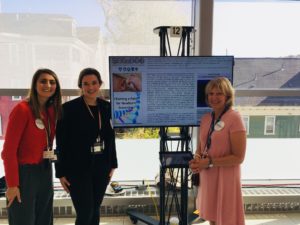
Pictured left to right:
Juliana Manganella (Boston Children’s Hospital), Devon Barrett (Boston Children’s Hospital), and Yvonne Chekaluk (Brigham and Women’s Hospital) debuted SEQaBOO for the first time to the public at Brigham and Women’s “Discover Brigham” event! The research team shared SEQaBOO’s (SEQuencing a Baby for an Optimal Outcome) vision to integrate whole genome sequencing into newborn screening. SEQaBOO plans to enroll newborns who refer on their newborn hearing screen test, infants with confirmed hearing loss, and their parents to opt-into whole genome sequencing to learn how genetic information can be used, along with the standard of care management, in making decisions and diagnoses for newborns with hearing loss.
Always time to share cookies with lab members especially Christmas Carrot Cookies – December, 2017
…. from our lab to you and yours – have a safe, memorable and joyous holiday season!
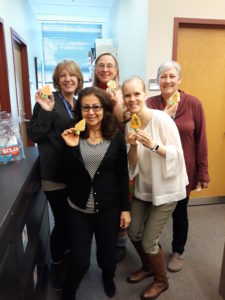
From left to right, bottom row: Nancy Robertson, Staff Scientist | Netta Makinen, Postdoc from Finland investigating Fibroids
From left to right, back row: Yvonne Chekaluk, SEQaBOO Project Manager | Linda Johnson, Sr. Grant Administrator | Ellen Wilch, DGAP Project Manager

